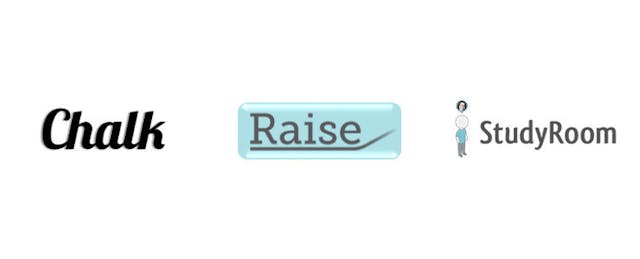On Friday, October 26, the third cohort of eleven startups in Imagine K12's program presented onstage to investors and media for Demo Day, the culmination of their fast-paced, three-month journey through the edtech incubator program. In our ongoing series, we'll take a look at each company and see what they're all about. (See our profiles of EdCanvas and Secur.ly here; our profiles of Digit Whiz, Tioki and DSK here; and our look at Code HS, NoRedInk and Smarter Cookie are here.)
Chalk takes a deadly aim at the piles of papers festering in school offices by offering to automate the experience of filling out a school form. (Think of all those beginning of the year school forms that parents must fill out--typically by hand--to get students into the system.) Cofounders Qian Wang, Sarah Chou, and Coulton Bunney developed Chalk working with elementary school teachers in the Cupertino Unified School district.
How Does It Work? Individual teachers or school administrators can both use Chalk. After registering (for free), educators can upload a document--say, a permission slip--to Chalk. Teachers then input the names and email addresses of their students (either manually, copy and pasting or by uploading a CSV file). Chalk can then send the forms to everyone on the address list and track when they are returned. At least for now, Chalk's team is also letting districts and schools send them printed copies of forms, which they then upload into the system.
Who’s Using It? Chalk launched on October 17. Its founders say several hundred people have tried it so far and that the Providence Public Schools are using it and that teachers in Cupertino Unified contributed to the product design.
Business Model: Chalk's founders say they intend to keep the software available for free for individuals (such as a classroom teacher). Groups--such as schools or districts, or even organizations such as the Parent Teacher Association--will be charged. The company is still working on its pricing model.
Competition: There are not any notable stand-alone programs that accept any type of form--especially at a low cost. (Docusign is one business solution but schools would find this an expensive method for collecting hundreds of forms.)
Founder Preston Silverman taught impoverished high school students in India and was dismayed when many of his students said they would never be able to afford college. Back in the U.S., Silverman found "surprisingly similar" conditions. Raise, which is still in development, aims to be a platform where students as young as 9th grade can begin earning "microscholarships"--that will add up over time--for college.
How Does It Work? Before Silverman launches his program, he is seeking funding for the scholarships from organizations (such as foundations or even local area businesses). When that funding is in place, Silverman will make a "dashboard" available to students where they can see "challenges" that will be associated with rewards. When students meet challenges, they will earn microscholarships; the dashboard will keep a running tally how much each student earns.
Who’s Using It? Raise Labs has not yet formally launched but in the course of building his plans, Silverman has consulted with a number of schools including Mission High School in San Francisco, Aspire in East Palo Alto and Green Dot Charter schools.
Business Model: Raise Labs aims to make its service available for free to students and schools. Because it reduces the administrative overhead of administrating grants, Raise would likely collect a fee from donors who support the microscholarships.
Competition: Raise Labs is modeled on crowd-sourcing programs from Donor's Choose and Kickstarter to Kiva. Although not a formal competitor, one similar program is Wishbone, which lets students identify afterschool or summer programs that they'd like to attend and then invites people to sponsor them to do such programs.
National media including the New York Times and The Washington Post have dubbed 2012 as the "year of the MOOCs," or massively open online courses. (See the New York Times here; or The Washington Post here.) One key challenge with such programs, however, is to support how students study together--or find one another and create virtual versions of online study groups. This is what StudyRoom, created by Emerson Malca and his three cofounders, aims to solve.
How Does It Work? Students create a simple avatar to represent themselves and then visit a study room to find others who are working on the same curriculum. Once a student joins a study group, they can share a white board, message one another and work collaboratively. StudyRoom itself creates the "rooms" for specific classes; it has created private rooms by request of teachers or schools. In November, the company expected to debut an easy way that students or teachers could "request" a private room.
Who’s Using It? StudyRoom launched in September and has started by supporting about a half dozen classes offered by edX and Coursera. It can support study groups from any school or organization. The founders say that 7,000 students have signed up and during the course of one recent week, as many as 1,700 students used StudyRooms.
Business Model: Use of StudyRoom will be free to students and (likely) to invidual teachers. But StudyRoom aims to build a model in which it can charge organizations--from MOOCs such as Udacity, Coursera or edX, to independent universities or even school districts--for setting up and maintaining high quality study groups. StudyRoom's founders believe that as online programs focus more intently on improving the proportion of students who successfully graduate from their classes, they will find StudyRoom a valuable partner.
Competition: Online programs (including MOOCs) have some support for online study groups; in other cases, students are left on their own to create study groups.


